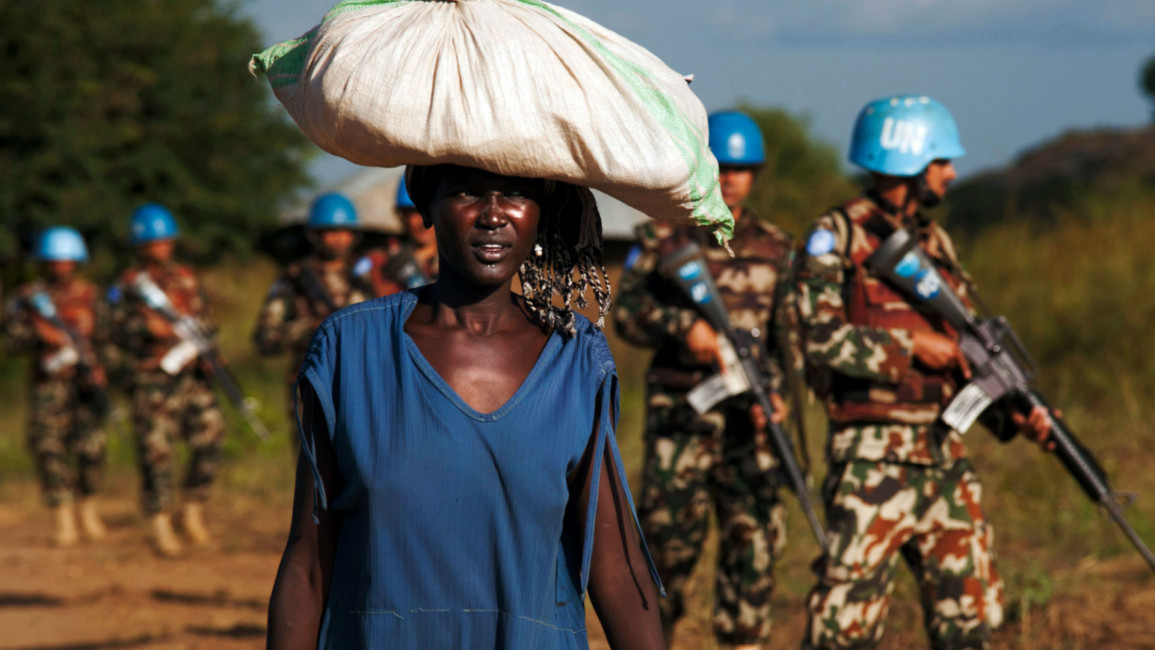Indonesia denies peacekeepers tried to leave Sudan with arms
Indonesia denies peacekeepers tried to leave Sudan with arms
Indonesia said that their peacekeepers in Sudan did not attempt to leave the country with weapons.
2 min read
The UNAMID mission was first deployed in Darfur in 2007 [Getty]
Indonesia has that United Nations peacekeepers from the country had sought to take weapons out of Sudan's conflict-wracked Darfur after they were allegedly caught leaving the region with arms.
The United Nations peace mission in Darfur last week opened an inquiry, saying that authorities had discovered weapons and military equipment in the baggage of a unit of peacekeepers at an airport in the region.
Authorities in Jakarta have confirmed the unit consisted of Indonesian police who were part of the UN-African Union Mission in Darfur (UNAMID), made up of about 20,000 troops and police from more than 30 countries.
However Indonesia's foreign ministry and police denied any wrongdoing and insisted the weapons did not belong to the officers.
"Preliminary information we received from the Indonesian police personnel is that (the weapons) don't belong to the Indonesian police," foreign ministry spokesman Arrmanatha Nasir said.
Police said the suitcase containing the weapons was not part of the Indonesian personnel's baggage, and was about 10 metres (33 feet) from the rest of their luggage.
"The person (in the airport) asked, does this belong to the Indonesians? And the reply was no," national police spokesman Martinus Sitompul said.
"The luggage did not have an Indonesian label on it, and the colour was different."
The suitcase was then put through a scanner and found to contain weapons.
The Indonesian peacekeepers have not been allowed leave Darfur pending the outcome of the UN investigation. An Indonesian police team will be sent to the region to provide assistance.
The UNAMID mission was first deployed in Darfur – a region the size of France – in 2007, a compromise between Western calls for a fully-fledged UN peacekeeping mission and Khartoum's insistence on an African solution.
Violence erupted in Darfur when ethnic minority rebels rose up against President Omar al-Bashir, accusing his Arab-dominated government of marginalising the region.
Bashir – who is wanted by the International Criminal Court – mounted a brutal counter-insurgency and at least 300,000 people have been killed since the conflict began in 2003, the UN says. Another 2.5 million have fled their homes.
The United Nations peace mission in Darfur last week opened an inquiry, saying that authorities had discovered weapons and military equipment in the baggage of a unit of peacekeepers at an airport in the region.
Authorities in Jakarta have confirmed the unit consisted of Indonesian police who were part of the UN-African Union Mission in Darfur (UNAMID), made up of about 20,000 troops and police from more than 30 countries.
However Indonesia's foreign ministry and police denied any wrongdoing and insisted the weapons did not belong to the officers.
"Preliminary information we received from the Indonesian police personnel is that (the weapons) don't belong to the Indonesian police," foreign ministry spokesman Arrmanatha Nasir said.
Police said the suitcase containing the weapons was not part of the Indonesian personnel's baggage, and was about 10 metres (33 feet) from the rest of their luggage.
"The person (in the airport) asked, does this belong to the Indonesians? And the reply was no," national police spokesman Martinus Sitompul said.
"The luggage did not have an Indonesian label on it, and the colour was different."
The suitcase was then put through a scanner and found to contain weapons.
The Indonesian peacekeepers have not been allowed leave Darfur pending the outcome of the UN investigation. An Indonesian police team will be sent to the region to provide assistance.
The UNAMID mission was first deployed in Darfur – a region the size of France – in 2007, a compromise between Western calls for a fully-fledged UN peacekeeping mission and Khartoum's insistence on an African solution.
Violence erupted in Darfur when ethnic minority rebels rose up against President Omar al-Bashir, accusing his Arab-dominated government of marginalising the region.
Bashir – who is wanted by the International Criminal Court – mounted a brutal counter-insurgency and at least 300,000 people have been killed since the conflict began in 2003, the UN says. Another 2.5 million have fled their homes.



